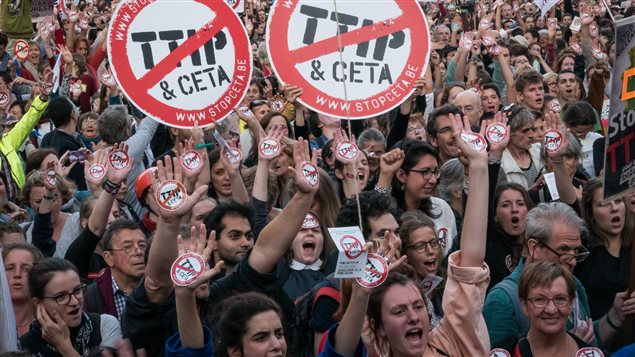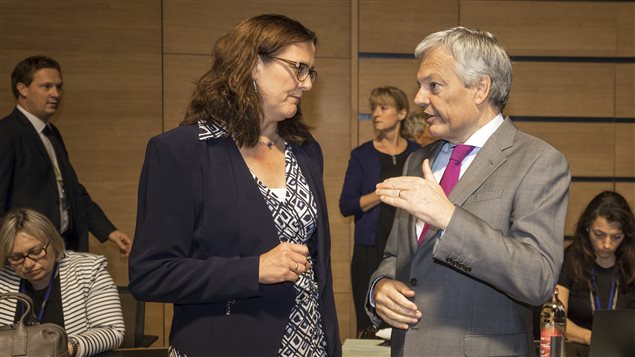Canadian officials remain “cautiously optimistic” they can clinch a last-minute deal to salvage a controversial free trade agreement between Canada and the European Union.
The landmark the Comprehensive Economic and Trade Agreement (CETA) deal ran into trouble in Belgium’s French-speaking Wallonia region last week just as it had cleared a key legal challenge in Germany’s highest court.
The CETA deal has to get the approval of all 28 EU trade ministers before it is formally signed at an EU-Canada summit on Oct. 27. But following a vote in the regional parliament last Friday, Wallonia leader Paul Magnette said he would “not give the full powers to the federal government” to back the deal.
Wallonian stumbling block
Wallonia fears that its farmers will be priced out of the market with cheap Canadian produce and that many of the labour standards they fought for will be swept away.
Prime Minister Justin Trudeau who was supposed to fly to Brussels next week to sign the deal has dispatched former Liberal minister Pierre Pettigrew to Wallonia in a last-ditch effort to try to sway the francophone region to support the deal, Alex Lawrence, the spokesperson of International Trade Minister Chrystia Freeland, told RCI.
“We are working hard with our European partners so CETA can be signed this fall and implemented next year,” Lawrence wrote in email. “We remain cautiously optimistic about CETA.”
EU Trade Commissioner Cecilia Malmstrom said there had to be an agreement by the time EU leaders wrap up two days of talks on Friday.
“Our Canadian friends need to know whether they should book their ticket or not,” she added.
CETA – which would eliminate 98 per cent of tariffs between Canada and EU states – is seen by many as a blueprint for the much larger and more controversial Transatlantic Trade and Investment Partnership (TTIP) being negotiated with the U.S.

Supporters argue that both deals would boost economic growth and create jobs, but opponents fear a watering down of standards such as labour and consumer rights and environmental protections. Hundreds of thousands of people across Europe have rallied against CETA and TTIP.
“If we don’t manage to have this trade agreement, there will not be a summit at this occasion,” Malmstrom said.
Wallonia’s objections are not the only obstacles to the free trade agreement.
Bulgaria and Romania also maintain “reservations” over Ottawa’s refusal to lift travel visa requirements for their citizens, said Slovak Economy Minister Peter Ziga, whose country holds the EU’s rotating presidency.
EU reputation at stake
Failure to conclude CETA would have consequences for the EU, Trudeau warned last week.
“If in a week or two we see that Europe is unable to sign a progressive trade agreement with a country like Canada, then with whom does Europe think it could to business in the years to come in this post-Brexit situation when there are many questions about Europe’s usefulness?” Trudeau said speaking in French during a joint press conference with French Prime Minister Manuel Valls.
“If Europe cannot manage to sign this agreement, then that sends a very clear message not just to Europeans but to the whole world that Europe is choosing a path that is not very productive either for the world or for its citizens, and that would be a shame.”
With files from The Associated Press







For reasons beyond our control, and for an undetermined period of time, our comment section is now closed. However, our social networks remain open to your contributions.